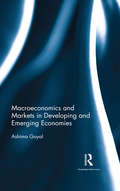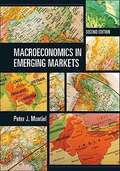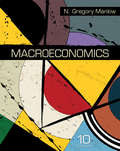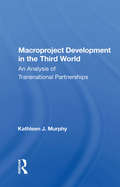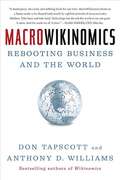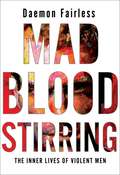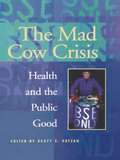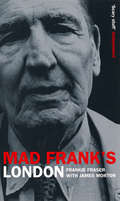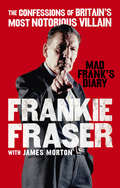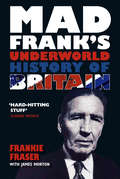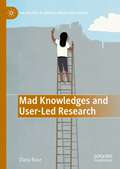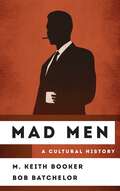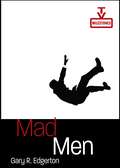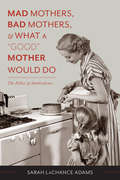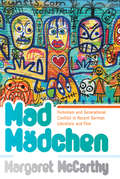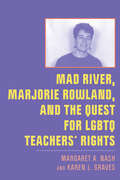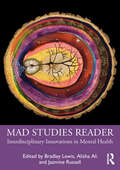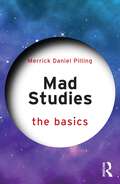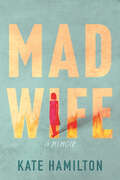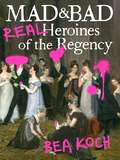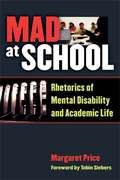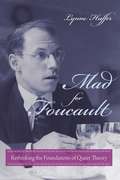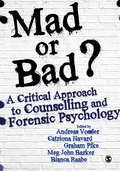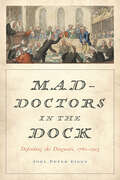- Table View
- List View
Macroeconomics and Markets in Developing and Emerging Economies
by Ashima GoyalThe book presents and further develops basic principles and concepts in international finance and open economy macroeconomics to make them more relevant for emerging and developing economies (EDEs). The volume emphasises the necessity of greater knowledge of context as populous Asian economies integrate with world markets, as well as the rapidly changing nature of the area due to rethinking after the global financial crisis. It addresses a host of themes, including key issues such as exchange rate economics, macroeconomic policy in an open economy, analytical frameworks for and experience of EDEs after liberalisation, the international financial system, currency and financial crises, continuing risks and regulatory response. This book will be useful to scholars and researchers of economics, especially in macroeconomics, business and finance and development studies.
Macroeconomics in Emerging Markets
by Peter J. MontielThe macroeconomic experience of emerging and developing economies has tended to be quite different from that of industrial countries. Compared to industrial countries, emerging and developing economies have tended to be much more unstable, with more severe boom/bust cycles, episodes of high inflation and a variety of financial crises. This textbook describes how the standard macroeconomic models that are used in industrial countries can be modified to help understand this experience and how institutional and policy reforms in emerging and developing economies may affect their future macroeconomic performance. This second edition differs from the first in offering: extensive new material on themes such as fiscal institutions, inflation targeting, emergent market crises, and the Great Recession; numerous application boxes; end-of-chapter questions; references for each chapter; more diagrams, less taxonomy, and a more reader-friendly narrative; and enhanced integration of all parts of the work.
Macroeconomics of Migration in New Member States
by Philip Schellekens Rudolfs BemsA report from the International Monetary Fund.
Macroeconomics: A Worth Interactive Ebook
by N. Gregory MankiwMankiw’s Macroeconomics has been the number one book for the intermediate macro course since the publication of the first edition. It maintains that bestselling status by continually bringing the leading edge of macroeconomics theory, research, and policy to the classroom, explaining complex concepts with exceptional clarity. This new edition is no exception, with Greg Mankiw adding emerging macro topics and frontline empirical research studies, while improving the book's already exemplary focus on teaching students to apply the analytical tools of macroeconomics to current events and policies
Macroproject Development In The Third World: An Analysis Of Transnational Partnerships
by Kathleen J. MurphyDuring the 1970s an unprecedented number of large-scale, projects of various kinds were launched in the Third World. Many multinational corporations that were experienced in initiating such projects in industrialized nations encountered unanticipated difficulties and risks in the new settings. This book assesses the experiences of multinationals and host nations and offers guidelines for effectively implementing macroprojects in developing areas. The author synthesizes data from more than 1600 macroprojects conducted during the 1970s; statistical information was supplemented by on-site surveys and interviews. She emphasizes that the successful development of a large-scale project hinges on the effective coordination of numerous individuals and groups—owners, project management contractors, indigeneous and foreign workers, financiers, government ministeries, consumers, etc. The key to success, she concludes, lies in anticipating and managing for sociocultural discontinuities and in setting up an adequate audit of organizational effectiveness. The guidelines resulting from her analysis are intended to assist multinational corporations and their host counterparts in understanding the new arrangements and approaches needed to successfully manage the macroprojects of the future.
Macrowikinomics: Rebooting Business and the World
by Don Tapscott Anthony D. WilliamsIn their 2007 bestseller, Wikinomics Don Tapscott and Anthony Williams showed the world how mass collaboration was changing the way businesses communicate, create value, and compete in the new global marketplace. Now, in the wake of the global financial crisis, the principles of wikinomics have become more powerful than ever. Many of the institutions that have served us well for decades or centuries seem stuck in the past and unable to move forward. And yet, in every corner of the globe, a powerful new model of economic and social innovation is sweeping across all sectors--one where people with drive, passion, and expertise take advantage of new Web-based tools to get more involved in making the world more prosperous, just, and sustainable.
Mad Blood Stirring: The Inner Lives Of Violent Men
by Daemon FairlessWith a rare clarity and fearless honesty, journalist Daemon Fairless tackles the horrors and compulsions of male violence from the perspective of someone who struggles with violent impulses himself, creating a non-fiction masterpiece with the narrative power of novels such as Fight Club and A History of Violence.A man, no matter how civilized, is still an animal--and sometimes a dangerous one. Men are responsible for the lion's share of assault, rape, murder and warfare. Conventional wisdom chalks this up to socialization, that men are taught to be violent. And they are. But there's more to it. Violence is a dangerous desire--a set of powerful and inherent emotions we are loath to own up to. And so there remains a hidden geography to male violence--an inner ecosystem of rage, dominance, blood-lust, insecurity and bravado--yet to be mapped. Mad Blood Stirring is journalist Daemon Fairless's riveting first-person travelogue through this territory as he seeks to understand the inner lives of violent men and, ultimately, himself.
Mad Cow Crisis: Health And The Public Good
by Scott C. RatzanThe announcement that BOSER might cause a fatal human disease "Creutzfeldt- Jacob disease CJD" triggered enormous media attention, public alarm and government wrangling that threatened the future of European integration.; As Scott Ratzan argues: "It is my belief that the [BOSER crisis] represents a quintessential case that will go down in history as the Exxon Valdez Union Carbide's Bhopal accident, and other such cases of interdisciplinary study".; This book offers lessons learned from the crisis, with contributions from experts with different viewpoints - veterinarians, Eurocrats, public relations experts, politicians, policy- makers, journalists and representatives of the beef industry.; It also offers a compilation of the key reports from governmental bodies. as a case-study in policy-making, scientific/health discovery and dissemination of information, as well as looking at the issues from the perspective of psychology and media studies.
Mad Frank's Britain
by James Morton Frank FraserMad Frankie Fraser has become a household name, known to millions as one of London's most notorious gangsters. In Mad Frank's London - his fourth book - Frank continues the shocking stories of his life of crime.Frankie Fraser recalls the good and the bad times, brings the criminals of his acquaintance to life, and guides us through the darker streets of London - as only a born Londoner, and true gangster could.
Mad Frank's Diary: The Confessions of Britain’s Most Notorious Villain
by James Morton Frankie Fraser‘They say I’ve killed 40 people and who am I to disagree? I’ve always liked even numbers.’Branded the dentist for using pliers to extract the teeth of those who owed money to his boss Charlie Richardson, Frankie Fraser was labelled the most dangerous man in Britain by two Home Secretaries. He is famous for his crimes, many of which have entered gangster folklore. In these diaries, however, originally published when he was 78, Mad Frank delved into areas he had never chosen, or dared, to talk about before. His day-by-day entries record unsolved murders, shoot-outs, crooked coppers, bribery, extortion, wrongful convictions, and even sex in prison. And by contrast, he also opens up with personal memories of growing up in poverty, in London's East End, and the reality of having to steal food to feed the family.Frankie Frasier died in 2014, and this rare True Crime classic is first-hand history at its most compelling.
Mad Frank's Underworld History of Britain
by James Morton Frank FraserSites of gruesome murders, stories of killings, frauds, jewel thefts and treachery are all part of Mad Frankie Fraser's grand tour of Britain's criminal underworld. As one of the most notorious gangsters of the 20th Century, he is perfectly placed to give us the lowdown on crimes from up and down the country, plus his take on crimes he was personally involved in and cases as yet unsolved. Written with crime author James Morton, this is the definitive guide to Britain's many lives of crime.
Mad Knowledges and User-Led Research (The Politics of Mental Health and Illness)
by Diana Susan RoseThis book presents a critical examination of the development of user involvement within research, and investigates the issues currently preventing a productive integration of Mad knowledges within research and practice. Drawing on social, linguistic and critical theories, it proposes the conditions needed to address the development of Mad epistemologies. The author’s unique approach deliberately highlights her own positionality and draws on decades of experience as a service recipient, survivor, activist and researcher to illustrate the structural and symbolic barriers faced. Employing concepts including epistemic injustice, individualization, normalization and structural violence, it suggests a radically new way of articulating ‘what’s the matter with us?’ In doing so, the book itself goes some way towards enacting the radical challenge to academic and epistemic hierarchies which, it is argued, will be required to further advance mad knowledges and user-led research. Crucially, it demonstrates how this approach can be both methodologically and conceptually rigorous. This novel work holds important insights for students and scholars across the humanities and social sciences; particularly those working in the areas of critical psychology, disability studies, Mad studies, feminist studies, critical race theory, and Queer theory.
Mad Men: A Cultural History (The Cultural History of Television)
by M. Keith Booker Bob Batchelor&“A comprehensive examination of the ways in which [the series] uses American cultural memory . . . to shape . . . characters&’ developments and the narrative arc.&” —Journal of American Culture From the opening credits that feature a silhouette falling among skyscrapers, Mad Men transcended its role as a series about the Madison Avenue advertising industry to become a modern classic. For seven seasons, Mad Men asked viewers to contemplate the 1960s anew, reassessing the era&’s stance on women&’s rights, race, war, politics, and family relationships that comprise the American Dream. Set in the mid-twentieth century, the show brought to light how deeply we still are connected to that age. The result is a show that continually asks us to rethink our own families, lives, work, and ethical beliefs as we strive for a better world.In Mad Men: A Cultural History, M. Keith Booker and Bob Batchelor offer an engaging analysis of the series, providing in-depth examinations of its many themes and nostalgic portrayals of the years from Camelot to Vietnam and beyond. Highly regarded cultural scholars and critics, Booker and Batchelor examine the show in its entirety, presenting readers with a deep but accessible exploration of the series, as well as look at its larger meanings and implications. This cultural history perspective reveals Mad Men&’s critical importance as a TV series, as well as its role as a tool for helping viewers understand how they are shaped by history and culture. &“This homage will appeal to fans and academic readers alike. . . . Recommended.&” —Choice &“Offers a stimulating point of view on the role of mass communication products as keys to understanding our society.&” —Journalism & Mass Communication Quarterly
Mad Men: Dream Come True Tv (TV Milestones Series)
by Gary R. EdgertonThis one-stop primer offers a succinct analysis of one of the most skillfully produced, artistically innovative, and culturally resonant scripted series in modern television. It opens by explaining how Mad Men (AMC, 2007–2015) functions as a representative example of much deeper and more profound structural changes happening in television since the 2000s. Gary R. Edgerton highlights influences driving the creation of the show, including creator Matthew Weiner’s personal connections to the subject matter and the development of the main character, Don Draper (Jon Hamm). Analysis of the show’s story progression is delineated by a pivotal shift from a culturally relevant Zeitgeist phenomenon to a narrative more concerned with Draper’s introspective and existential journey to reconciliation and self-awareness. Cultural reflections are also explored with interrogations of privilege and prejudice, the American Dream, ethnicity, race, gender politics, and class as witnessed through the program’s complex and conflicted characters. Following its debut, Mad Men quickly became a bellwether of contemporary culture. The award-winning series set the creative standard in drama over the span of its initial run and is now recognized as a milestone in the history and development of scripted television. Throughout its seven seasons, the series struck a delicate balance of being both complex and cerebral while also entertaining and accessible, a balance that Edgerton skillfully carries over to this book.
Mad Mothers, Bad Mothers, and What a "Good" Mother Would Do: The Ethics of Ambivalence
by Sarah LaChance AdamsWhen a mother kills her child, we call her a bad mother, but, as this book shows, even mothers who intend to do their children harm are not easily categorized as "mad" or "bad." Maternal love is a complex emotion rich with contradictory impulses and desires, and motherhood is a conflicted state in which women constantly renegotiate the needs mother and child, the self and the other. Applying care ethics philosophy and the work of Emmanuel Levinas, Maurice Merleau-Ponty, and Simone de Beauvoir to real-world experiences of motherhood, Sarah LaChance Adams throws the inherent tensions of motherhood into sharp relief, drawing a more nuanced portrait of the mother and child relationship than previously conceived. The maternal example is particularly instructive for ethical theory, highlighting the dynamics of human interdependence while also affirming separate interests. LaChance Adams particularly focuses on maternal ambivalence and its morally productive role in reinforcing the divergence between oneself and others, helping to recognize the particularities of situation, and negotiating the difference between one's own needs and the desires of others. She ultimately argues maternal filicide is a social problem requiring a collective solution that ethical philosophy and philosophies of care can inform.
Mad Mädchen: Feminism and Generational Conflict in Recent German Literature and Film
by Margaret McCarthyThe last two decades have been transformational, often discordant ones for German feminism, as a new cohort of activists has come of age and challenged many of the movement's strategic and philosophical orthodoxies. Mad Mädchen offers an incisive analysis of these trans-generational debates, identifying the mother-daughter themes and other tropes that have defined their representation in German literature, film, and media. Author Margaret McCarthy investigates female subjectivity as it processes political discourse to define itself through both differences and affinities among women. Ultimately, such a model suggests new ways of re-imagining feminist solidarity across generational, ethnic, and racial lines.
Mad River, Marjorie Rowland, and the Quest for LGBTQ Teachers’ Rights (New Directions in the History of Education)
by Margaret A. Nash Karen L. GravesMad River, Marjorie Rowland, and the Quest for LGBTQ Teachers’ Rights addresses an important legal case that set the stage for today’s LGBTQ civil rights–a case that almost no one has heard of. Marjorie Rowland v. Mad River School District involves an Ohio guidance counselor fired in 1974 for being bisexual. Rowland’s case made it to the U.S. Supreme Court, but the justices declined to consider it. In a spectacular published dissent, Justice Brennan laid out arguments for why the First and Fourteenth Amendments apply to bisexuals, gays, and lesbians. That dissent has been the foundation for LGBTQ civil rights advances since. In the first in-depth treatment of this foundational legal case, authors Margaret A. Nash and Karen L. Graves tell the story of that case and of Marjorie Rowland, the pioneer who fought for employment rights for LGBTQ educators and who paid a heavy price for that fight. It brings the story of LGBTQ educators’ rights to the present, including commentary on Bostock v Clayton County, the 2020 Supreme Court case that struck down employment discrimination against LGBT workers.
Mad Studies Reader: Interdisciplinary Innovations in Mental Health
by Bradley Lewis, Alisha Ali and Jazmine RussellThe last few years have brought increased writings from activists, artists, scholars, and concerned clinicians that cast a critical and constructive eye on psychiatry, mental health care, and the cultural relations of mental difference. With particular focus on accounts of lived experience and readings that cover issues of epistemic and social injustice in mental health discourse, the Mad Studies Reader brings together voices that advance anti-sanist approaches to scholarship, practice, art, and activism in this realm.Beyond offering a theoretical and historical overview of mad studies, this Reader draws on the perspectives, voices, and experiences of artists, mad pride activists, humanities and social science scholars, and critical clinicians to explore the complexity of mental life and mental difference. Voices from these groups confront and challenge standard approaches to mental difference. They advance new structures of meaning and practice that are inclusive of those who have been systematically subjugated and promote anti-sanist approaches to counter inequalities, prejudices, and discrimination. Confronting modes of psychological oppression and the power of a few to interpret and define difference for so many, the Mad Studies Reader asks the critical question of how these approaches may be reconsidered, resisted, and reclaimed.This collection will be of interest to mental health clinicians; students and scholars of the arts, humanities and social sciences; and anyone who has been affected by mental difference, directly or indirectly, who is curious to explore new perspectives.
Mad Studies: The Basics (The Basics)
by Merrick Daniel PillingMad Studies: The Basics provides an introductory account of a field that emerged from, and must remain grounded within, community knowledge, activism, and the perspectives of those who have experienced madness and mental health systems.It is a concise text that introduces the field through an exploration of some origins of Mad Studies, as well as two interrelated queries: what does Mad Studies help us understand, and what does Mad Studies help us do? This exploration reveals that Mad Studies is an interdisciplinary, intersectional, and multi-vocal field that demands different answers to the very meaning of the beliefs, behaviours, and bodymind experiences that are currently characterized as being indicative of mental illness. At the heart of Mad Studies is a liberationist desire to resist, transform, and abolish the systems that create marginalization, and implement responses to madness that are grounded in the collective knowledge of those deemed Mad. This book shows that the contributions of Indigenous, Black, racialized, queer, and trans people must be understood as central to, and already embedded within, Mad Studies and activism rather than as add-ons, expansions, or efforts to make Mad Studies more inclusive.It will be of interest to all scholars and students of disability studies, social work, gender studies, education, health sciences, sociology, and psychology, as well as practitioners in mental health care, and those with lived experience of madness and mental health systems.
Mad Wife: A Memoir
by Kate HamiltonSubmitting to unwanted sex destroyed Kate&’s love for her husband But she considered killing herself before she could imagine leavingIn this electrifying literary memoir, Kate Hamilton deftly traces her complicated journey from loving wife to gaslit victim to furious feminist with an urgent goal: to expose how women are pressured to uphold the institutions of marriage and family, no matter the cost.In the tradition of Know My Name and The Argonauts, Hamilton braids her own story with cultural criticism to argue that we must face the misogyny lurking in the shadows of marriage in the 21st century. She examines the beliefs and conditioning that held her in an increasingly destructive marriage and unflinchingly documents what she did to keep her family together—therapy, unwanted sex with her husband, swinging, affairs, an abortion—without always knowing what she freely chose. And she considers the damage that was done, to herself and others, until she could acknowledge that to save herself and her sons, she had to destroy her marriage.Emotionally intense and timely, Mad Wife interrogates how marriage and the institutions that support it provide the perfect ecosystem for abuse of women and children, endangering their lives and denying them autonomy—all in the service of men&’s desires.
Mad and Bad: Real Heroines of the Regency
by Bea KochDiscover a feminist pop history that looks beyond the Ton and Jane Austen to highlight the Regency women who succeeded on their own terms and were largely lost to history -- until now.Regency England is a world immortalized by Jane Austen and Lord Byron in their beloved novels and poems. The popular image of the Regency continues to be mythologized by the hundreds of romance novels set in the period, which focus almost exclusively on wealthy, white, Christian members of the upper classes.But there are hundreds of fascinating women who don't fit history books limited perception of what was historically accurate for early 19th century England. Women like Dido Elizabeth Belle, whose mother was a slave but was raised by her white father's family in England, Caroline Herschel, who acted as her brother's assistant as he hunted the heavens for comets, and ended up discovering eight on her own, Anne Lister, who lived on her own terms with her common-law wife at Shibden Hall, and Judith Montefiore, a Jewish woman who wrote the first English language Kosher cookbook.As one of the owners of the successful romance-only bookstore The Ripped Bodice, Bea Koch has had a front row seat to controversies surrounding what is accepted as "historically accurate" for the wildly popular Regency period. Following in the popular footsteps of books like Ann Shen's Bad Girls Throughout History, Koch takes the Regency, one of the most loved and idealized historical time periods and a huge inspiration for American pop culture, and reveals the independent-minded, standard-breaking real historical women who lived life on their terms. She also examines broader questions of culture in chapters that focus on the LGBTQ and Jewish communities, the lives of women of color in the Regency, and women who broke barriers in fields like astronomy and paleontology. In Mad and Bad, we look beyond popular perception of the Regency into the even more vibrant, diverse, and fascinating historical truth.
Mad at School: Rhetorics of Mental Disability and Academic Life
by Margaret PriceMad at School explores the contested boundaries between disability, illness, and mental illness in the setting of U.S. higher education. Much of the research and teaching within disability studies assumes a disabled body but a rational and energetic (an 'agile') mind. In Mad at School, scholar and disabilities activist Margaret Price asks: How might our education practices change if we understood disability to incorporate the disabled mind?
Mad for Foucault: Rethinking the Foundations of Queer Theory (Gender and Culture Series)
by Lynne HufferMichel Foucault was the first to embed the roots of human sexuality in discipline and biopolitics, therefore revolutionizing our conception of sex and its relationship to society, economics, and culture. Yet over the past two decades, scholars have limited themselves to the study of Foucault's History of Sexuality, volume 1 paying lesser attention to his equally explosive History of Madness. In this earlier volume, Foucault recasts Western rationalism as a project that both produces and represses sexual deviants, calling out the complicity of modern science and the exclusionary nature of family morality. By reclaiming these deft moves, Lynne Huffer teases out exciting new strands of Foucauldian thought. She then revisits the theorist's ethical work in light of these discoveries, divining an ethics of eros that sees sexuality as a lived experience we are repeatedly called on to remember. Throughout her study, Huffer weaves her own experiences together with Foucault's, sampling from unpublished interviews and other archived materials in order to intimately rework the problem of sexuality as a product of reason.
Mad or Bad?: A Critical Approach to Counselling and Forensic Psychology
by Andreas Vossler Dr Bianca Raabe Dr Catriona Havard Professor Graham Pike Meg-John BarkerA cutting-edge text that provides a comprehensive introduction to mental health problems and criminal behaviour, this book explores the link between mental health and criminality and considers the most common and effective therapeutic approaches for working with offenders and victims of crime. · Part 1 explores the predominant tensions between forensic and therapeutic agendas; · Part 2 considers how criminal and ‘insane’ identities and careers may be considered gendered, classed, culturally and age-dependent experiences, and be related to power and oppression; · Part 3 examines issues around sex and sexuality in forensic and therapeutic settings; · Part 4 introduces a range of therapeutic approaches for working with offenders and victims of crime; · Part 5 covers forensic and therapeutic practices, including programmes for the prevention of both mental health issues and offending. Edited by an expert team from the Open University and written by a broad range of contributors, this book draws on a wealth of experience in this popular subject area. It will be a key text for students of forensic psychology, counselling and psychotherapy, and for health and social care professionals working in therapeutic and forensic settings.
Mad-Doctors in the Dock: Defending the Diagnosis 1760–1913
by Joel Peter Eigen“Detailed courtroom narratives . . . give us a colorful and gripping sense of the life-and-death maneuvers involved in mounting an insanity defense.” —Andrew Scull, author of Madness in CivilizationShortly before she pushed her infant daughter headfirst into a bucket of water and fastened the lid, Annie Cherry warmed the pail because, as she later explained to a police officer, “It would have been cruel to put her in cold water.” Afterwards, this mother sat down and poured herself a cup of tea. At Cherry’s trial at the Old Bailey in 1877, Henry Charlton Bastian, physician to the National Hospital for the Paralyzed and Epileptic, focused his testimony on her preternatural calm following the drowning. Like many other late Victorian medical men, Bastian believed that the mother’s act and her subsequent behavior indicated homicidal mania, a novel species of madness that challenged the law’s criterion for assigning criminal culpability.How did Dr. Bastian and his cohort of London’s physicians, surgeons, and apothecaries—originally known as “mad-doctors”—arrive at such an innovative diagnosis, and how did they defend it in court? Mad-Doctors in the Dock is a sophisticated exploration of the history of the insanity defense in the English courtroom from the middle of the eighteenth century to the early twentieth century. Joel Peter Eigen examines courtroom testimony offered in nearly 1,000insanity trials, transporting us into the world of psychiatric diagnosis and criminal justice. The first comprehensive account of how medical insight and folk psychology met in the courtroom, this book makes clear the tragedy of the crimes, the spectacle of the trials, and the consequences of the diagnosis for the emerging field of forensic psychiatry.
